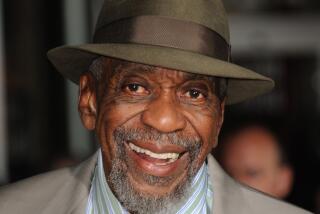Kennedy Comeback
- Share via
It’s an unexpectedly high time in the career of 74-year-old Tony winner and five-time Oscar nominee Arthur Kennedy. The veteran actor has two films out this year.
First, there’s the release of the restoration of the legendary 1962 “Lawrence of Arabia,” in which he played Jackson Bentley, an American photo-journalist based loosely on Lowell Thomas. Then, next month, he plays a
seasoned Maine shipbuilder whose business has fallen on hard times in “Signs of Life.” It’s his first film in a decade.
“I threw in the towel in 1978,” he says. “I got a phone call shortly after ‘Lawrence’ in which I accepted an Italian-Russian film. It (“Italiano Brava Gente”) was a huge success in Europe and kept me busy in mostly Italian and Spanish films for years.”
In retrospect, Kennedy felt it turned into a major career mistake. He called most of the films “stinkers.” His feeling of isolation intensified with the death of his wife in 1975 and a series of eye diseases. Then, he lost his driver’s license and decided, as he was still physically active, to move to Savannah, Ga., a city where he could get around on foot.
“You have to remember that Los Angeles back in the ‘40s was a small company town. The cops would actually drive you home when you got a little tight. Drinking was the major social activity. I can still remember Errol Flynn giving Ronnie Reagan a hard time on ‘Desperate Journey’ because he used to spill out his glass when he thought no one was looking.”
Kennedy graduated from Warner Bros.’ stock company in the 1940s to his Tony-winning role as Biff in “Death of a Salesman” and Oscar nominations as the crippled brother in “Champion” and the blinded war hero in “Bright Victory.” He held a unique position in American movies for creating sympathetic though flawed and tortured individuals in such films as “Peyton Place,” “Trial” and “Elmer Gantry.”
Not a believer in fate, Kennedy insisted that craft is the only thing that counts. Still, it was chance that led to his role in “Signs of Life.” During a visit to his daughter, a New York-based actress, her agent told him he’d like to suggest him for a movie.
“I didn’t give it much thought but, true to his word, he called back and set up a meeting with the producer and director. I read the script and was mighty impressed. The dialogue, the rhythms, had real quality. What began to seep through my troubled brain was that I needed a good part and here it was.”
More to Read
Only good movies
Get the Indie Focus newsletter, Mark Olsen's weekly guide to the world of cinema.
You may occasionally receive promotional content from the Los Angeles Times.










